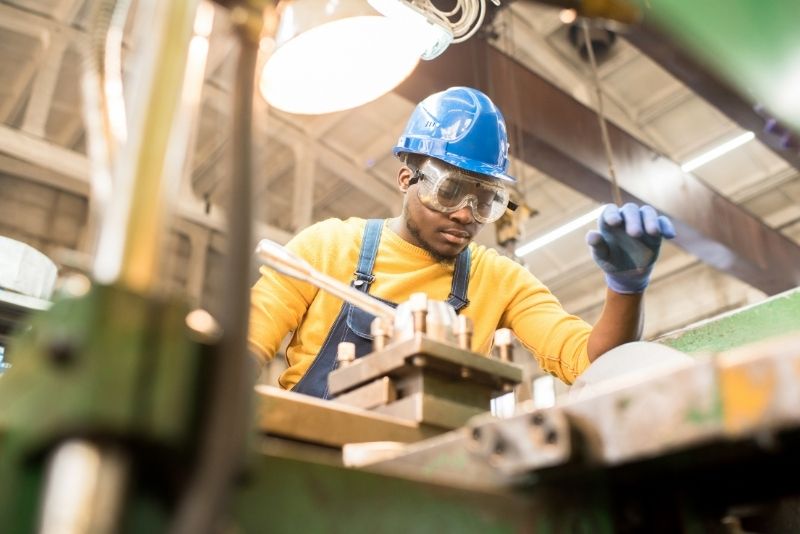Since March 2020, a lot has changed in our lives and the global business. While all manufacturers had their fair share of obstacles with the supply chain management, some experienced a sharp increase in demand while others experienced a sharp decrease in demand which both can be very harmful to a business. Industries such as technology, healthcare, and pharmaceuticals thrived meanwhile aviation, energy and the automotive industry struggled. New technologies are facilitating operations, especially during pandemics, worth mentioning here AR for manufacturing workflow.
The important point here to understand is as we get back to normal life with countries accelerating their vaccination programs, the habits and work processes that were adopted during the epidemic are here to stay. Especially when the economic conditions for manufacturers and customers are thought. An example of changed economic conditions can be customers seeking higher value and service for what they are paying. This means manufacturers need to adapt quickly to new customer demands. Also to put more emphasis on making the manufacturing process more flexible while reducing cost.

How AR Remote Services Can Help Business Safety During Covid-19?
Another aspect manufacturers should take cognizance of is the safety and health of their workforce. Field technicians’ safety and health are crucial when it comes to business continuity and employee well-being. A case where one or more field workers are tested positive for Covid-19 can create a negative domino effect. Especially, in an industry where the field workforce is getting older, safety and health issues can be discussed more regularly.
Plus, due to their job requirements, experts need to travel to different countries regularly to solve technical issues. For example, an expert that lives in the United States needs to share their extensive knowledge about machines and control systems with assembly workers who live in China. With complications regarding Covid-19, countries are following different regulations to keep the safety of their citizens. Therefore, the process of sharing expertise can take longer than usual. These complications can be as below;
- Quarantine Restrictions
- General & Mental Health of Employees & Their Families
- Post-Covid Business Trip
- Environmental Cost
To start with the quarantine restrictions, experts need to stay isolated for at least two weeks in general for many countries which causes a delay of job activities that prohibits the production process.
During this time an expert can go through the stress of getting Covid-19. Also, lose focus while trying to adapt to a different country. An example of that can be as simple as missed connections, traffic, and less structured workdays due to time differences. All these factors while affecting the business can also affect the second point which is related to employees’ personal life. Additionally, might affect work motivation which can highly affect the output also.
Considering experts and field workers, that are relatively old, want to nurture a more stable lifestyle. The aftermath of the business trip can increase the risk of affecting friends and family as well as others too. On the companies side according to Forbes’ Welcome To The Post-Covid Business Trip article HSBC, one of the largest investment banks and financial services holding companies in the world, saved about $300 million according to the bank’s most recent results. Banking companies whose operations relates solely to digital system save a significant amount of money from business trips. Also, manufacturing companies can save a serious amount and reduce their cost too.
A small amount of money saved from business traveling can be used to optimize the digitalization of the work process that brings experts and field workers together remotely with the help of Virtual and Augmented Reality instructions.
Another benefit manufacturing companies can gain from reducing their business trips is related to them reducing their carbon footprint. Considering that the manufacturing industry is one of the largest contributors to greenhouse gas emissions worldwide. The growing population of Millennials and Gen Z as conscious consumers care more about climate change. Consequently, companies and manufacturers should commit more to their sustainability policies.
However, there are reasons why industries including manufacturing invest in business travel the way they did before Covid-19:
- Extending the Business Network
- Understanding the Culture Worked With
- Enjoyment
AR Remote working can limit one-on-one, personal communication on regular basis for manufacturing workflow.
When used solely for business it is great in terms of saving time and diagnosing the problem immediately. However, organizational culture and commitment to the workplace might relate to more personal connections and understanding the culture of people working with. A classic example can be Americans who are more individualistic, wanting to work in an environment where they can progress by adding personal value to the business, and, Japanese people who are more used to adding value to business by working in a collective team.
And there is also, the enjoyment factor of business travel for employees who like to travel. It can seem like that aspect of the business is taken away however companies can arrange business travels for their employees solely for networking and getting to know each other that is more flexible and inclusive of employees’ families or partners. This way they can increase work motivation while reducing the cost of travel. And creating an option for employees to travel on their own time and to where they prefer which can again increase motivation.
Empowering Millennials Through AR as the New Workforce on Manufacturing Workflow
As indicated previously, the aging workforce is an ongoing problem for the industry. Manufacturers are having a hard time employing or retaining junior-level service technicians since job descriptions and the Millennial’s expectations of a job do not have the same understanding. For example, according to The 2016 Deloitte Millennial Survey for most Millennials, one of the most important aspects of a job is good work-life balance. However, a service technicians’ duties are mostly stressful, require a lot of travel, and hinder flexibility with no home office option. Putting the 2020 Covid-19 Pandemic on top of this 2016 Survey, both Millennials and employees from former generations are finding jobs that value the work-life balance as more retainable and valuable.
For example, software like VSight allows remote field technicians and experts to connect and collaborate on maintenance, repair, operations (MRO). This is possible via live video, audio powered by Augmented Reality. This brings an acceleration of the production process. Also helps the business to meet the growing demand of customers and create straightforward solutions for employees. By accelerating skill development and providing empowering assistance, AR is now revolutionizing the business process for many. Augmented Reality creates a platform where field workers and experts can collaborate professionally with practical training tools.



